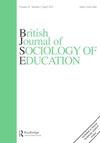Educational purity and technological danger: understanding scepticism towards the use of telepresence robots in school
IF 2.1
3区 教育学
Q1 EDUCATION & EDUCATIONAL RESEARCH
引用次数: 4
Abstract
Abstract This article contributes to the sociology of education and technology by providing a cultural analysis of scepticism towards new technologies in school, using reactions to the telepresence robot ‘AV1’ as its case. AV1 is designed to connect ‘homebound’ students with their ‘school-based’ teachers and classmates. Despite its idealistic purpose, the robot has been met with significant scepticism by Norwegian school workers. To understand why, the article proposes the novel concepts of ‘educational purity’ and ‘technological danger’ to highlight the shared beliefs that underlie school workers’ concerns. We find that school workers see AV1 as threatening key ideals of schools being pedagogically oriented, physically copresent and bounded institutions – all concerns that reflect widespread ideas about how technologies tend to (not) function within educational contexts. In highlighting these symbolic tensions between new technologies and schools, the article sets a course for future studies into the cultural sociology of education and technology.教育的纯粹性和技术的危险:理解对在学校使用远程呈现机器人的怀疑
本文通过对学校新技术的怀疑态度进行文化分析,以对远程呈现机器人“AV1”的反应为例,为教育和技术社会学做出了贡献。AV1旨在将“宅在家”的学生与“校本”的老师和同学联系起来。尽管有着理想主义的目的,这个机器人却遭到了挪威学校工作人员的严重怀疑。为了理解其中的原因,文章提出了“教育纯洁性”和“技术危险”的新概念,以强调学校工作人员所关注的共同信念。我们发现,学校工作人员将AV1视为威胁学校以教学为导向、物理存在和有限机构的关键理想——所有这些担忧都反映了关于技术如何在教育环境中发挥作用的普遍观点。在强调这些新技术和学校之间的象征性紧张关系的同时,本文为未来的教育和技术文化社会学研究奠定了基础。
本文章由计算机程序翻译,如有差异,请以英文原文为准。
求助全文
约1分钟内获得全文
求助全文
来源期刊
CiteScore
3.70
自引率
9.50%
发文量
74
期刊介绍:
British Journal of Sociology of Education is one of the most renowned international scholarly journals in the field. The journal publishes high quality original, theoretically informed analyses of the relationship between education and society, and has an outstanding record of addressing major global debates about the social significance and impact of educational policy, provision, processes and practice in many countries around the world. The journal engages with a diverse range of contemporary and emergent social theories along with a wide range of methodological approaches. Articles investigate the discursive politics of education, social stratification and mobility, the social dimensions of all aspects of pedagogy and the curriculum, and the experiences of all those involved, from the most privileged to the most disadvantaged. The vitality of the journal is sustained by its commitment to offer independent, critical evaluations of the ways in which education interfaces with local, national, regional and global developments, contexts and agendas in all phases of formal and informal education. Contributions are expected to take into account the wide international readership of British Journal of Sociology of Education, and exhibit knowledge of previously published articles in the field. Submissions should be well located within sociological theory, and should not only be rigorous and reflexive methodologically, but also offer original insights to educational problems and or perspectives.

 求助内容:
求助内容: 应助结果提醒方式:
应助结果提醒方式:


